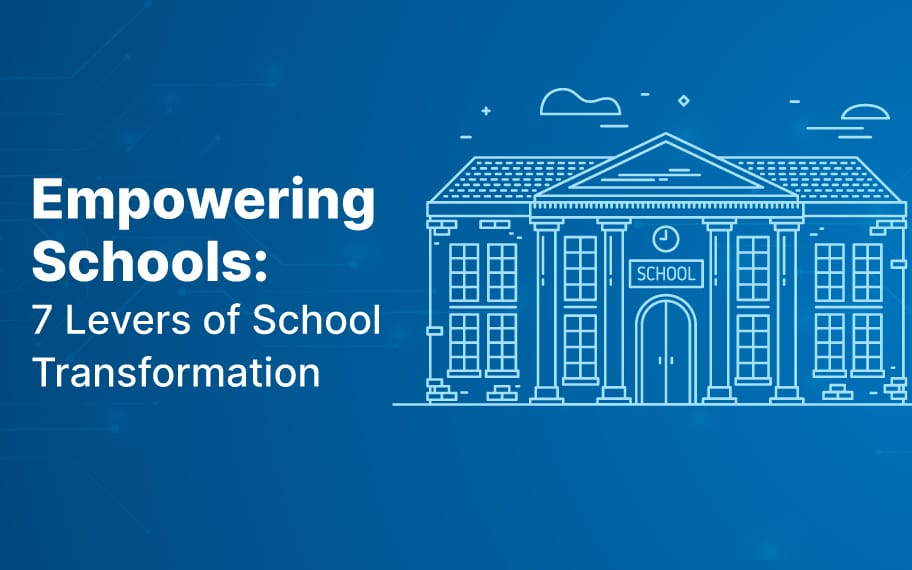While teachers are the guiding spearheads and nurturing bearers of the learning process, school leaders have a pivotal role in empowering the education system. The significance of empowering students in their educational journey emerges as a paradigm shift in today's rapidly evolving educational landscape. The role of schools transcends traditional teaching methodologies, encompassing the nurturing of students to become self-directed learners capable of leading their own educational journeys.
A recent dialogue with visionary school leaders Willie and Jonathan illuminated the pivotal role of data-driven decision-making in catalyzing school transformation. Also, Willie and Jonathan introduced the concept of the "seven levers of school transformation". Moreover, the book Leverage Leadership by Paul Bambrick-Santoyo also talks about 7 levers that can seamlessly help with better time management and empower school transformation!
What are the 7 Levers of School Transformation?
The list comprises instructional as well as cultural levers, including
A Data-Driven Approach
The process of teaching does not end with a lecture or session. Finding what the students have learned and bridging any gap in their knowledge is crucial. Intuitive data reports and pragmatic actions can help achieve the same more effectively. By implementing a data-driven approach, school leaders can enable teachers to draft personalized study plans and instructions for improved student learning, optimized learning outcomes, and better time management. It further streamlines the planning, scheduling, grading, recordkeeping, and administrative and organizational tasks.
Weekly Observations and Feedback
Performance evaluation and constructive feedback are two essential columns in the education system, whether for students or teachers. However, how do school leaders plan the evaluation to strike the right balance between communicating targeted feedback and giving positive, effectual encouragement? The first solution can be time-based observations. Not too frequently and not too infrequently; it should exhibit that the school leaders have taken time to evaluate. A weekly observation of 15 minutes can be an effective plan. It will allow regular observation, motivate the teachers to maintain quality education, and convey the message that one bad lesson does not translate to bad teaching.
The second solution regards feedback. Instead of picking on every little thing and giving extensive feedback reports, school leaders should focus on one major aspect and allow the teachers to work on the same. It reduces the pressure and promotes better development.
Strategic Planning for Quality Lessons
A sizable amount of teachers’ time goes into planning the lessons. School leaders can find a way to streamline the planning process to develop effective strategies in less time. Make sure that the teachers are aware of the specific goals for each lesson. Encourage them to ask the important question: what must students master by the end? It creates a better scope for targeting lesson plans without demanding much time. While school leaders find ways to improve the education system, they should encourage teachers to become the leaders in class. That way, teachers will not just teach; they will start covering all the bases to ensure comprehensive learning.
Training and Practicing the Principles
Coming up with improvement theories and development plans is the first step, and practicing the same is second. School leaders must drive teachers to discover new and better ways to teach and implement them in their classrooms. Furthermore, they must evaluate if the new ways are being practiced accurately and if the outcomes positively affect student learning.
Ethics and Character Building
Consider ethos, the underlying principles, beliefs, and values that should influence teachers and their behavior. The integrity and credibility of a teacher can help build trust and a positive learning environment in the classroom. School leaders must jot down high ethical standards for teachers that align with the vision and mission of the schools. It will be significant in improving teacher morale, student engagement, and the learning system.
Culture
Professional commitment is important; what results in better success is the genuine will to work at a particular establishment. Professional satisfaction is a crucial factor, and your school's culture can and will be significant in ensuring it. Teachers must feel encouraged and motivated and not compelled to come to class daily and teach to their best abilities. Generally, the first few days or weeks determine how one feels about the institution. Set a positive tone from the very first impression. Show teachers how their well-being is a priority.
Systematic Coaching
Each school leader should offer support and encouragement to the teachers. From observing the lessons to providing feedback to make improvement plans and strategies, school leaders should be involved in the entire process. Remember that it should not be a one-time interaction. There should be regular and reliable communication and discussion between school leaders and teachers to ensure upskilling and overall development.
Wrapping Up!
In conclusion, the integration of data-driven decision-making and strategic application of these seven levers of school transformation carves a clear path to excellence, equity, and innovation in education. This journey transcends aspiration, offering a concrete roadmap to shape a future where education is synonymous with empowerment and lifelong learning. By identifying and prioritizing these levers based on the unique needs and goals of your respective schools, principals and administrators can develop targeted interventions to drive meaningful change.
Learn more about Teachmint plans here.











